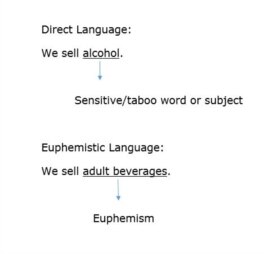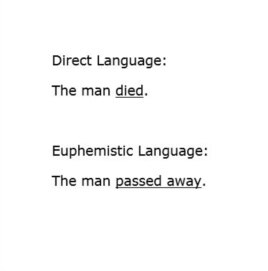20 July, 2017
Comedian George Carlin is famous for talking about language. He is famous for criticizing indirect or overly pleasant speech. Consider these lines from one of his performances:
"I don't like words that hide the truth. I don't like words that conceal reality. I don't like euphemisms – or euphemistic language. And American English is loaded with euphemisms. Because Americans have a lot of trouble dealing with reality."
Today we will explore the case of euphemisms – pleasant or nice words that take the place of direct language. We will give you examples of euphemisms, and explain why they are so common.
Direct speech and politeness
In earlier Everyday Grammar stories, we discussed how Americans sometimes choose indirect speech. They consider it to be more polite.
What takes the place of direct speech?
Americans often replace it with creative noun phrases, phrasal verbs, or expressions. These words give the same basic meaning as direct language, but they have a very different style.
Americans often use euphemisms when talking about sensitive topics – death, love, body processes, anything they might not want to speak of directly.
Here is an example.
Consider the noun, alcohol. Alcohol consumption can be a taboo topic in American society. So, some restaurants and stores sell adult beverages instead.
The term adult beverages is a euphemism. It refers to alcohol, but in an indirect manner.

Euphemisms and death
You might think that euphemisms are very informal, or slang. You might think that euphemisms are silly.
But, Americans often use euphemisms when talking about serious issues – death, for one.
Consider the verb die. In euphemistic language, Americans often replace it with the phrasal verb, pass away.

When expressing news about a person's death, Americans might say, "I was sad to hear that so-and-so passed away."
Americans often send condolence cards to those who have lost friends or family. These condolence cards often do not use the verb die. Instead, they use euphemistic or indirect language.
Here is another example. Instead of saying euthanize, or even kill, Americans might say, put to sleep.
Put to sleep sounds much gentler and kinder than euthanize or kill.
Parents often use this structure when a child's beloved pet needs to be euthanized by a veterinarian. The reason they do this is to avoid making the child sadder about the situation.
Food and euphemisms
Euphemisms are not always used to talk about sensitive topics. Sometimes business people create euphemisms to increase sales.
Consider this example.
If you were to ask Americans if they would like to eat Patagonian toothfish, they would probably say no. Toothfish just does not sound like an appealing food to eat.
However, if you were to ask Americans if they would like to eat Chilean sea bass, they might say yes.
The two names refer to the exact same kind of fish.
Ralph Keyes is an author. He wrote "Euphemania," a book about euphemisms.
In an interview with NPR, Keyes noted that "[At] one time, Patagonian toothfish was freely available to anyone because no one wanted to eat it...until a very clever entrepreneurial sea importer renamed it Chilean sea bass."
Now, you will see Chilean sea bass on menus at expensive restaurants. The lowly toothfish has come a long way!
Euphemisms and style
Euphemisms often make sentences longer. They can also take away clarity – especially in writing.
For these reasons, writing style guides often recommend that writers not use euphemisms or indirect language.
Whether you like euphemisms or not, you should learn some of the common ones. They play a part in American culture – for better or for worse.
The next time you are watching a film, listening to music or reading the news, try to look for euphemistic language. Ask yourself why the speaker or writer might want to use a euphemism instead of direct language.
We will leave you with a euphemism from the 2004 comedy, Anchorman. Actor Will Ferrell is expressing surprise. Instead of using bad or offensive words, he refers to Odin, a character in Norse mythology.
Americans do not use this expression. They rarely refer to Norse mythology. That is part of the humor of the line.
I'm Pete Musto.
And I'm John Russell.
John Russell wrote this story for Learning English. Mario Ritter was the editor.
We want to hear from you. When is it right or wrong to use a euphemism? Write to us in the Comments Section.
________________________________________________________________
Words in This Story
conceal – v. to prevent disclosure or recognition of
euphemism – n. a mild or pleasant word or phrase that is used instead of one that is unpleasant or offensive
creative – adj. having or showing an ability to make new things or think of new ideas
taboo – adj. not acceptable to talk about or do
sensitive – adj. likely to cause people to become upset
condolence – n. a feeling or expression of sympathy and sadness especially when someone is suffering because of the death of a family member, a friend, etc.
euthanize – v. to kill or permit the death of hopelessly sick or injured individuals (such as persons or domestic animals) in a relatively painless way for reasons of mercy
veterinarian – n. a person qualified and authorized to practice veterinary medicine
entrepreneurial – adj. a person who starts a business and is willing to risk loss in order to make money
mythology – n. the myths or stories of a particular group or culture